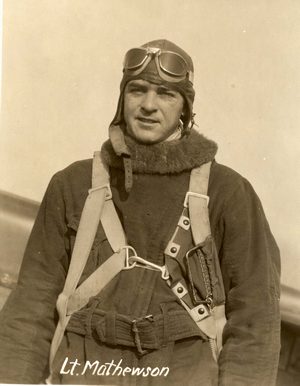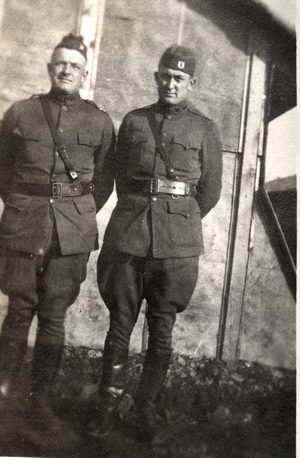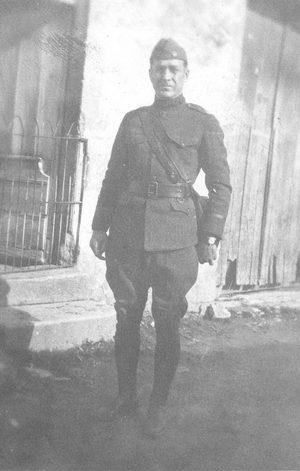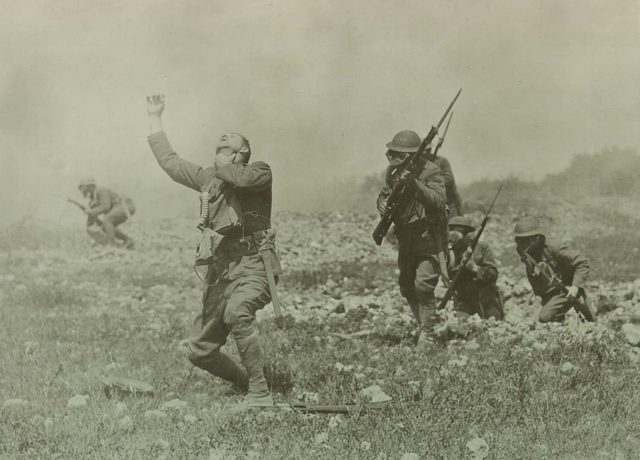

Chemical Warfare Service: World War One’s House
of Horrors
The Little Known Service of Branch Rickey, Ty
Cobb and the Great Matty
by Frank Ceresi
 |
| Christy Mathewson Photo from Frank Ceresi Collection |
Imagine that you are scared, cold and hungry,
on foreign turf, fighting in the trenches against an enemy that
wants nothing better than to annihilate you and your comrades.
Imagine that as you inch forward in battle the enemy begins
to lob cylinders of gas in your direction and then follows up
immediately by shooting rifle pellets directly at you filled with
something you vaguely remember as being called “phosegene gas”.
A sickly smell now fills the air. You are so glad that you
had your gas mask on even though it is unwieldy and adds more weight
to your tiring body. Now
imagine that you look towards your side where your buddy is, and see
that he could not reach to his belt quickly enough to put his mask
on over his face so that you see that he took in a small breath of
“exposed” air. Then imagine within an instant his terror stricken
eyes opening wide, his face turning purple as he looks through you -
and within seconds he is dead.
Such scenes of horror dominated
trench fighting in France during World War One and three of the most
influential and celebrated baseball icons of all time - Ty Cobb,
Christy Mathewson, and Branch Rickey - served in a special elite
unit to combat this terror, the “Chemical Warfare Service”, at the
very same time in the same division during the most crucial time of
the war. How was it
that these three extraordinary men, none of them youngsters pining
to show off their youthful mettle, would end up leaving the safety
of the baseball diamond and their families and voluntarily join the
service to defend their country overseas and battle the enemy in a
most brutal fashion?
 |
| Christy Mathewson (left) Ty Cobb (right) Photo from Frank Ceresi Collection |
Precious little has been
written about this trio and their link in war but it is a story that
reveals much about qualities of character that resonate on the ball
field and in the battle field.
Rickey was 38 years of age and the sole support of four young
children. Matty, already retired from baseball after notching 373
victories, was also 38 years with a family. And Ty Cobb, fresh from
leading the American League in batting, a feat he would do more
often than any man in the history of the game, was the “youthful”
age of 32. He was also the sole support of his family. Without
question, all three could have easily stayed home and aided their
country by using their celebrity to head war bond drives or some
similar activity to raise needed capital. But the answer to the
question of why they chose the Chemical Warfare Service not only
reflects their obvious intense patriotism but also speaks volumes to
the strength of their personal character and leadership
capabilities. To fully grasp the sacrifices these men made during a
time of war, one must first learn of the importance and unique role
of the Chemical Warfare Service.
The Chemical Warfare Service,
or “The Gas and Flame Division” as it would commonly be called, was
created at the height of the war to quell a growing public alarm as
news of gas attacks such as described above began to filter home and
soldiers on the front lines wrote their families about “gas
attacks”, a deadly and virulent horror of war introduced on the
battlefields by the Germans two and a half years earlier.
At first, soldiers were given simple gas masks to carry as
potential protection but the masks were cumbersome, ineffective, and
required the men to breath through large unwieldy tubes. By 1918 the
military was increasingly concerned and re-doubled efforts to meet
the gas threat. After all, eight million men had died during the
bloody war in just four years!
During the summer of 1918, the brass hatched a plan, secret
at first, to repel the attacks with a new elite fighting unit
officially named “The Chemical Warfare Service”. Choosing
 |
| Branch Rickey Photo from Frank Ceresi Collection |
Major General William L. Sibert
told waiting the press corps that the military would combat this
“inhuman” form of warfare by recruiting baseball players and
athletes with exceptional skill. Significantly, he also said that
Armed Forces would not simply rely on the youngest members of the
public to resist these attacks. He emphasized: “We do not just want
good young athletes…we are searching for good strong men, endowed
with extraordinary capabilities to lead others during gas attacks”.
The die was cast. The “Gas and Flame Division” would
only be open to men,
strong of body and mind, who had proven themselves to be leaders as
athletes and capable of exercising superior judgment in an
emergency. Long before Tom Wolfe coined the phrase, they were
looking for men with the “right stuff” and what better pool of men
to draw from than baseball players who proved their leadership
capabilities at the highest level of play?
Men like Branch Rickey, who volunteered to serve in this new
and important squad, would be commissioned in as a major.
Similarly, his friends
Christy Mathewson, nicknamed “The Christian Gentleman” because of
his gentle ways, and the fierce Ty Cobb, already American icons,
would be recruited as captains. By August all three had been
accepted into the “Gas and Flame Division”.
The pace of the war accelerated
quickly. Within a few weeks of their acceptance, the three men’s
lives intersected in a way much different than when their days were
filled with baseball. In
September, Cobb and Rickey were told to immediately report for duty
and secretly sail with their division to France to join others,
including Matty, who had already been stationed near the front lines
for weeks. The war was at a critical stage. The three were to join
one another, with Rickey taking command of the unit. They were
tasked to prepare for battle with special orders to anticipate
German gas attacks where the heaviest trench fighting would be, then
turn the tables on the enemy by quickly spraying their flanks with
jets of flame from tanks strapped onto their backs. Then, once their
tanks emptied they were to lob special “gas grenades” at the fallen
Germans and clear the area. The men were primed! The trio’s unit had
already participated in several operations supporting allied tanks
and infantry. Now their ranks would swell by a fresh batch of men,
including three of baseball’s best.
By September the Germans threw
caution to the wind and mustered as much of an attack in
 |
| The Horrors of a Great War Gas
Attack Photo from Frank Ceresi Collection |
But fate would have things in
store for the trio other than trench warfare because as October
turned to November the rumors of surrender proved true. On Armistice
Day, November 11, 1918 the Germans surrendered. The bloodiest world
war was finally over. Within weeks, the three, their lives changed
forever and inexorably linked by their valor as military men,
returned to the
Today all three men are
enshrined in the Baseball Hall of Fame. Their leadership qualities,
the very traits that enticed them to join the military elite in the
“Gas and Flame Division”, resonate to this day. Ty Cobb is still
widely recognized as being one of the top two or three baseball
players of all time. Christy Mathewson, whose life ended prematurely
because of his service in the “Gas and Flame Division”, is a beloved
figure, recognized as being amongst the top pitchers ever. And the
patriotic Branch Rickey’s place in our culture grows with each and
every year. When he helped set the stage for the civil rights
movement by shattering the color barrier, nearly 30 years after his
service in the “Gas and Flame Division”, the “Mahatma” - as members
of the press affectionately called him - opened the door for the
equal rights for everyone.
This page last updated June 18, 2008.
Copyright © 2013 Gary Bedingfield (Baseball in Wartime). All Rights Reserved.